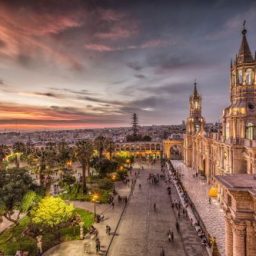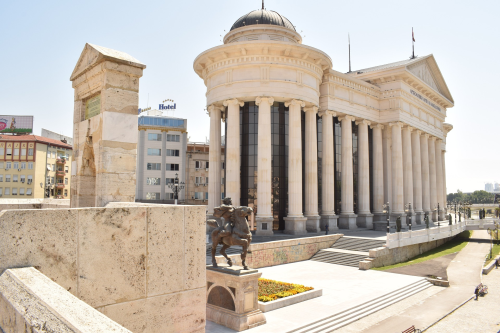

The Balkan Peninsula attracts not only tourists’ attention, but is also one of the most interesting spots in the world for historians and linguists. Intersecting local cultures and their coexistence is a fascinating research subject.
The Macedonian language is one of many curiosities of the region. Some researchers (and politicians) are arguing whether it should be even classified as a language. Where do those doubts come from? What is worth knowing about this Balkan speech? Let’s find out!
A country that changed its name
North Macedonia appeared on maps under the current name in February 2019. Before that, the country was known to the broader public simply as Macedonia (and earlier FYROM, the Former Yugoslav Republic of Macedonia). The reason behind the recent change was an ongoing dispute with Greece over the fact that one of the country’s northern regions is also called Macedonia.
North Macedonia lies in the southern part of the Balkan Peninsula. It borders Serbia, Greece, Bulgaria, and Albania. The country doesn’t have access to the sea, but the locals and tourists can rest on the banks of the scenic Lake Ohrid. A significant part of Macedonian territory lies in highland and mountain areas. The highest peak is Golem Korab (2764 metres above sea level).
The population of North Macedonia has surpassed 2 million people. Almost 60% of citizens live in urban areas. The biggest city is the capital, Skopje. Other smaller but significant towns are Bitola, Kumanovo, and Prilep (source: worldometers.info). The most numerous minorities are Albanians, Turkish, Romani, Serbs, and Bosnian people.
The languages of Macedonia
The official language of North Macedonia is Macedonian, used by around 67% of the country’s population (source: worlddata.info). In some regions (e.g. municipalities of Tetovo, Brvenica and Vrapčište) Albanian also enjoys the status of the co-official language. Its users are the most significant minority of the country. Other languages present in Macedonia are: Turkish, Romani, Serbian, Bosnian and Aromanian.
Macedonian language
Macedonian is considered a Slavic language. Together with Bulgarian (to which it is closely related), Serbian, Croatian, and Montenegrin, it belongs to the South Slavic branch. The number of Macedonian speakers is about 1.6 million people in North Macedonia, Bulgaria, and Albania (source: worlddata.com).
There is an ongoing dispute between some linguists regarding the distinctiveness of Macedonian. Some researchers believe that the language should be considered just a dialect of Bulgarian. The supporters of this theory indicate that Macedonian has been standardized relatively recently and point out the similarity of both languages.
The year 2017 brought a breakthrough in complicated relations between North Macedonia and Bulgaria, as politicians of both countries signed a friendship treaty, which was prepared in two versions: Bulgarian and Macedonian. This event was regarded as a turning point in the recognition of the language.
Dialects of Macedonian language
There are 27 dialects in Macedonian. Researchers grouped them in 6 categories: Northern, Southern, Southwestern, Western, Eastern and Central dialects. Among them, it is possible to distinguish, e.g.: Skopje-Veles dialect, Reka dialect, Ohrid dialect and Kostur dialect.
History of Macedonian Language
In the mediaeval times, on the territory, which is known now as North Macedonia, the main language was Old Church Slavonic popularized by the missionaries Cyril and Methodius. This language has undergone many transformations throughout its history, giving birth to other Slavic languages. One of them was Bulgarian. Modern Macedonian language emerged from the neighbouring speech at the turn of the 20th and 21st centuries.
The Macedonian literature began to develop separately from Bulgarian writings in the 1920s and 30s. The most significant authors of that period were Kočo Racin, Vasil Iljoski, and Anton Panov. For the full independence of the language and its standardization, Macedonians had to wait until the end of the Second World War. In 1944, the National Liberation Army declared the linguistic autonomy of the country.
Macedonian alphabet
The Macedonian alphabet (Македонска азбука, Makedonska azbuka) has been based on the Cyrillic script, adapted to the pronunciation of Macedonian language. It has 31 letters. Three of them, “ѓ” (gje), “ќ” (kje) and “ѕ” (dze), are unique. It is not possible to find them in any neighbouring writing system.
The official version of the Macedonian alphabet was accepted in 1945 as a result of years of research done by the country’s best linguists. As a base, they used earlier ideas of Vuk Karadžić and Krste Misirkov. Before the standardization, the Macedonian language has been written in many ways: with Russian, Bulgarian or Serbian scripts.
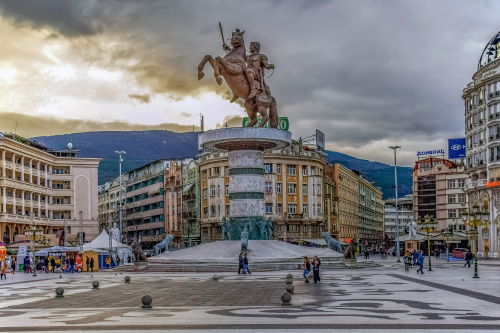
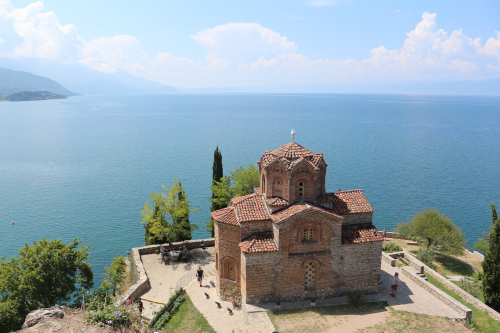
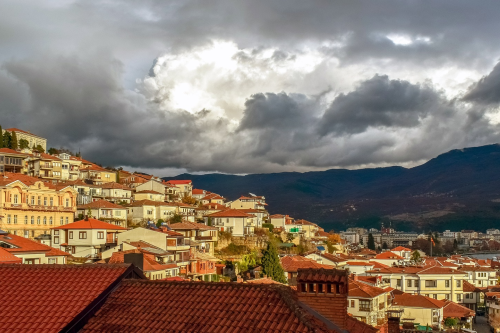
Albanian language
In terms of popularity, Albanian is the second language of North Macedonia. One-quarter of the country’s population belongs to the Albanian minority (source: Albanian Studies). Its largest percentage lives in the Northern regions. In 2019, the language was officially recognized in some municipalities.
Turkish language
The Turkish language is widespread in the diaspora that consists of almost 78 thousand people. Children up to the fourth grade have the right to choose it as the main language of education. It is also possible at the later stages, however, not many institutions in the country offer this option. For that reason, a significant part of the Turkish minority knows Macedonian and uses it daily (source: Minority Rights Group International).
Romani language
Romani people living in North Macedonia use the Balkan dialect of the Romani language, known as Arli. The language has been recognized as official in the small municipality Šuto Orizari (Skopje) mainly inhabited by the Romani minority (source: Austrian Academy of Sciences).
Basic phrases in Macedonian
We have prepared for you a list of basic phrases, which will help you to get around during your trip to Macedonia. Learn the most useful expressions and don’t be afraid to speak with locals! They will appreciate your effort to grasp the basics of the Macedonian language.
- Добро утро (dobro utro) – Good morning
- Добар ден (dobar den) – Good afternoon
- Добровечер (dobro večer) – Good evening
- Добра ноќ (dobra noḱ) – Good night
- Здраво (zdravo) – Hello
- Чао (čao) – Bye
- Како си? (Kako si?) – How are you?
- Те молам (te molam) – Please
- Ви благодарам (vi blagodaram) – Thank you
- Фала (fala) – Thanks
- Извини (izvini) – Sorry
- Да (da) – Yes
- Не (ne) – No
- Од каде си? (Od kade si?) – Where are you from?
- Јас сум од… (Jas sum od…) – I am from…
- Како се викаш? (Kako se vikaš?) – What is your name?
- Јас се викам… (Jas se vikam…) – My name is…
- Што ти е професија? (Što ti e profesija?) – What is your profession?
- Дали зборуваш англиски јазик? (Dali zboruvaš angliski jazik?) – Do you speak English?
- Колку имаш години? (Kolku imaš godini?) – How old are you?
Shopping list in Macedonian
We are certain that during your stay in Macedonia you will visit a local shop more than once. Maybe you will even decide to bring some delicacies as a souvenir. To make shopping easier for you, we prepared a small dictionary of food items.
- Домат (domat) – tomato
- Краставица (krastavica) – cucumber
- Пиперка (piperka) – pepper
- Марула (marula) – salad
- Црн патлиџан (crn patlidžan) – eggplant
- Тиквичка (tikvička) – zucchini
- Кромид (kromid) – onion
- Јагода (jagoda) – strawberry
- Малина (malina) – raspberry
- Портокал (portokal) – orange
- Јаболко (jabolko) – apple
- Праска (praska) – peach
- Лимон (limon) – lemon
- Лубеница (lubenica) – watermelon
- Леб (leb) – bread
- Путер (puter) – butter
- Mасло (maslo) – oil
- Cирење (sirenje) – cheese
- Mед (med) – honey
- Jајца (jajca) – eggs
- Tестенини (testenini) – pasta
- Oриз (oriz) – rice
Is Macedonian a difficult language to learn?
As Macedonian belongs to the Slavic language family, the advanced users of other languages from the group (e.g. Russian, Polish, Czech) will have a strong handicap in the learning process. For English speakers, it has been classified as the language of the second category in terms of difficulty. It means that an estimated number of 1,100 class hours is required to achieve fluency in Macedonian (source: NearlyFluent).
If you plan to establish professional cooperation with companies based in North Macedonia, our English-Macedonian translator will help you with translating all the required documents (e.g. contracts, offers, sales inquiries, correspondence, and others). We invite you to consult our offer!

